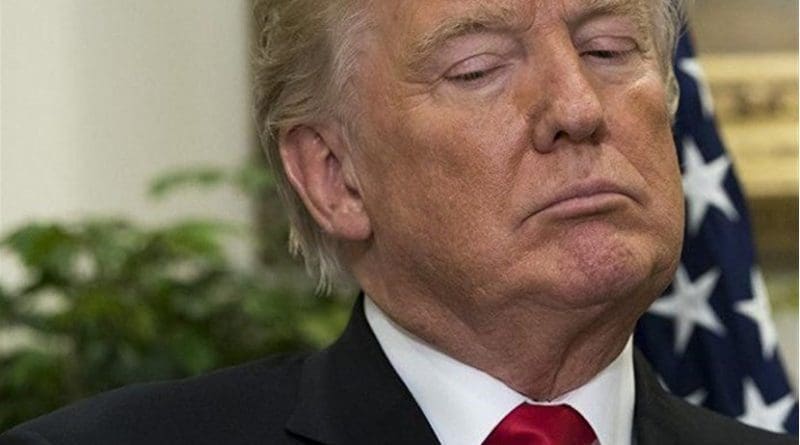President Trump And Crimes Against Humanity – OpEd
According to a new book, President Trump knowingly downplayed coronavirus risks. As other critics have argued, his administration’s decisions represent crimes against humanity.
Recently, Bob Woodward, associate editor at the Washington Post and one of the legendary Watergate journalists, published Rage, a new book on President Trump’s first term, which draws on 18 interviews that Woodward conducted with Trump between December 2019 and last July.
Here’s its key message: President Trump knowingly downplayed coronavirus risks.
Certainly, the Trump administration knew the basic facts about the outbreak already on January 3 and soon thereafter about its potential for airborne transmission, yet chose not to mobilize against the outbreak.
What’s new about Woodward’s book is Trump’s own acknowledgement he misrepresented the facts of the pandemic to the American people and thus to the rest of the world.
Let’s recap the facts as we now know them.
Bad flu vs deadly stuff
On January 3, when the virus gene sequencing was completed by China’s CDC and emergency monitoring initiated, the World Health Organization (WHO) and relevant countries were informed about the virus.
That same day, U.S. CDC director Dr. Robert R. Redfield called Alex M. Azar II, secretary of health and human services, telling him that China had potentially discovered a new coronavirus. Azar told his chief of staff to make sure that the National Security Council (NSC) was aware.
There was a reason to Azar’s concern. When Trump arrived in the White House three years before, he eliminated the global health unit that had been part of the NSC. Now a new team was launched and daily meetings began in the basement of the West Wing.
Yet, no mobilization occurred. Rather, a long debate began within the administration over “what to tell to the American public.”
In mid-January, a patient with confirmed infection – the first American case – sought care at a medical facility in the state of Washington. When the WHO declared the global emergency on January 30, Trump claimed that “we have it very well under control.”
Yet, President Trump had a very different message to Bob Woodward. “You just breathe the air and that’s how it’s passed. And so that’s a very tricky one… It’s also more deadly than even your strenuous flu,” Trump said in a February 7 call.
“This is deadly stuff,” the president repeated for emphasis.
Blaming WHO, Dr Tedros and China for administration’s disasters
With outbreaks, time is a critical resource. Any delay is immensely costly. By the end of January, there were 5 official cases in the US. Today, the cases amount to 7 million, while deaths exceed 200,000, thanks in part to the Trump administration’s obfuscation.
Despite emergency measures and proactive measures in several countries, the WHO’s repeated pleas and its international alert, the Trump White House failed to mobilize against the outbreak in January, February, even much of March.
Instead, President Trump claimed that his administration had the virus under control (Feb 23) and “[coronavirus is] going to disappear… like a miracle.” (Feb 27). It was the Democrats’ ’“new hoax” (Feb 28). The virus was “very mild” and the infected could get better by “going to work” (Mar 4). The common flu was worse than COVID-19 (Mar 9).
Yet, a month before, Trump had warned Woodward about the deadliness of the virus.
On March 11, the WHO declared the novel coronavirus a pandemic. Two days later, the White House finally began to mobilize federal resources against the COVID-19. But now it planned to reduce the damage by reopening the economy after mid-April. Meanwhile, it blamed the WHO, its chief Dr Tedros and China for the pandemic.
What Trump acknowledged to Woodward at the time was something very different. “I wanted to always play it down,” he said on March 19, according to Woodward. He deliberately sought to minimize the danger.
“I wanted to always play it down,” the president said.
No Nobel prize for crimes against humanity
Following the public controversy over Woodward’s Rage, White House press secretary Kayleigh McEnany said “the president has never lied to the American public on COVID.”
Meanwhile, Trump was nominated for Nobel Peace prize by Nordic far-right, Islamophobic and anti-immigrant conservatives. These represent the kind of groups that Trump’s former chief strategist Steve Bannon has tried to unite in Europe (until he was arrested and charged with conspiracy to commit mail fraud and money laundering).
In late April, Richard Horton, editor-in-chief of the highly-regarded Lancet medical journal, criticized President Trump’s decision to suspend funding to the WHO: “Trump’s decision to harm an agency whose sole purpose is to protect the health and wellbeing of the world’s peoples is a crime against humanity. It is a knowing and inhumane attack against the global civilian population.”
Since then, the Trump administration has committed a series of new policy plunders, including premature exits and purposeful suppression of science-based public-health measures. As a result, United States and the Americas remain the global epicenter of the crisis.
By now, almost 30 million people have been infected and almost 1 million have perished amid the pandemic; half of them in the U.S. and the Americas. By the year-end, these figures could still double.
The last thing President Trump and his administration deserve is a Nobel prize. Both have knowingly withheld pandemic facts from the public, undermined the WHO’s efforts to protect the wellbeing of the world’s peoples, failed to protect Americans and thereby contributed to the spread of the pandemic worldwide.
Such decisions represent crimes against humanity.

